Gameplay
The show featured seven people involved in each episode. Two of the people were players, with one usually a returning champion, and five of the others made up a panel. The second contestant was always a member of the previous show's panel, having qualified to challenge the champion based on their winnings on the previous show. As such, the panel changed on an almost-daily basis. A panelist was limited to two consecutive appearances in the panel without becoming a challenger, and a replacement from a panelist-turned-challenger was chosen from the audience.
Main game
A question with many possible answers would be posed to everyone (for example: "What makes a camel funny looking?") and an answer that was selected by the show's staff was shown to the challenging player in control of the question and the home audience (with the previous example, "his knobby knees" would be the answer shown). The player decided if the answer would be said by any of the five panelists (yes or no). The player then decided to "play it safe" or go for the "longshot".
Hall then asked the panelists for an answer. If the player played it safe, then he asked each of the panelists for one answer. Should the player call for a longshot, if he or she said yes (that the panelists would get the answer), he only asked three panelists for an answer (or, if the contestant said no, that the panelists wouldn't get the answer, all five panelists were asked for an answer, and the first two were asked for a second answer, for a total of seven answers).
If one of the five panelists guessed the selected answer, he or she received a bonus prize. If the contestant predicted correctly, he or she scored one point (two points for a longshot); an incorrect prediction awarded the point(s) to the opposing player. Five points won the championship.
Payoff round
One more question is asked to the winner and the panelists. There are two answers (that are not shown to anyone at first) that are chosen by the staff. Hall asks each panelist for a response to the question. Each incorrect response is worth $300. After five responses, if either of the two chosen answers are not given, the player tries for $5,000 in cash and a new car, but the player must eliminate one of the two chosen answers from play.
At this point, the player can quit after each incorrect response with the accumulated cash. If the panelists still do not say the selected answer still in play, the player wins the $5,000 and the car. If one of the two answers were said prior to the halfway mark of the round, but the second response wasn't said after all ten responses, the player just wins the $5,000. If the panelists say both answers, the player loses any cash accumulated in the Payoff Round. Note that a panelist could win more prizes if he or she gives one of the chosen responses.
The panelist who wins the most prizes in the game becomes the new challenger in the next game. Winning contestants were able to compete up to a maximum of five games or until defeated.

Hollywood Squares is an American game show in which two contestants compete in a game of tic-tac-toe to win cash and prizes. The show piloted on NBC in 1965 and the regular series debuted in 1966 on the same network. The board for the game is a 3 × 3 vertical stack of open-faced cubes, each occupied by a celebrity seated at a desk and facing the contestants. The stars are asked questions by the host and the contestants judge the truth of their answers to gain squares in the right pattern to win the game.

Match Game is an American television panel game show that premiered on NBC in 1962 and has been revived several times over the course of the last six decades. The game features contestants trying to match answers given by celebrity panelists to fill-in-the-blank questions. Beginning with the CBS run of the 1970s, the questions are often formed as humorous double entendres.
To Tell the Truth is an American television panel show in which four celebrity panelists are presented with three contestants and must identify which is the "central character" whose unusual occupation or experience has been read aloud by the show's moderator/host. When the panelists question the contestants, the two impostors may lie whereas the "central character" must tell the truth. The setup adds the impostor element to the format of What's My Line? and I've Got a Secret.

Hot Potato is a television game show that was broadcast on NBC in the United States from January 23 to June 29, 1984. From April 23 until its conclusion, the show was known as Celebrity Hot Potato.

Figure It Out is an American children's panel game show that aired on Nickelodeon. The original series, hosted by Summer Sanders, ran for four seasons from July 7, 1997, to December 12, 1999. The show was revived in 2012, with Jeff Sutphen as host, with the revival airing from June 11, 2012, to July 16, 2013. The series was originally recorded at Nickelodeon Studios at Universal Studios in Orlando, Florida. The revival episodes were filmed on stage 19 at Paramount Studios in Los Angeles.

Beat the Geeks is an American television game show that aired on Comedy Central from 2001 to 2002. The show was rerun on The Comedy Network in Canada.
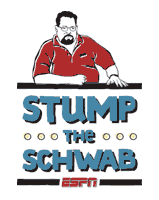
Stump the Schwab is an American game show that aired on ESPN2 and ESPN Classic from July 8, 2004 to September 29, 2006. The show featured three contestants trying to defeat Howie Schwab, ESPN's first statistician, in a sports trivia contest. Stuart Scott was the show's host. The show also appeared on Canada's The Score Television Network.
Time Machine is an American game show where contestants compete to answer trivia questions about popular culture and recent history to win prizes. The show aired on NBC from January 7 through April 26, 1985, and was hosted by John Davidson. Charlie Tuna was the announcer, with Rich Jeffries as his substitute. Reg Grundy Productions produced the series, and upon its premiere Time Machine was one of three Grundy series airing on NBC.
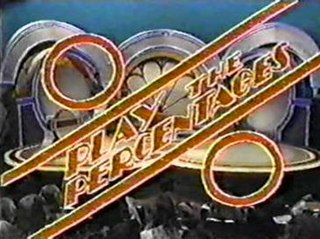
Play the Percentages is an American game show hosted by Geoff Edwards which aired in syndication from January 7 to September 12, 1980. Jay Stewart announced for the first six weeks, after which Bob Hilton became the permanent announcer.
Blankety Blanks is an Australian game show based on the American game show Match Game. It was hosted by Graham Kennedy on the 0-10 Network from 1977–1978.
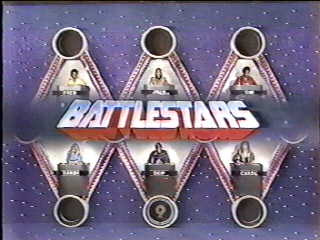
Battlestars is an American game show that aired on NBC during the 1980s. The program's concept was developed and produced by Merrill Heatter, featuring a six-celebrity panel. The object of the game is to "capture" the celebrities by lighting up numbers positioned around triangle shapes, inside of which sat each panelist. Similar to Hollywood Squares, which Heatter also co-created and produced, the celebrities are asked questions by the host, and the contestants judge the truth of their answers in order to light up the numbers.
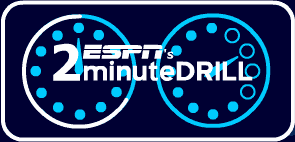
2 Minute Drill is an ESPN game show based on the general knowledge UK game show Mastermind. The program aired from September 11, 2000 to December 28, 2001. ESPN Classic aired reruns of the series daily at 11:30 a.m. Eastern.

All-Star Blitz is an American game show that aired on ABC from April 8 to December 20, 1985, with reruns airing on the USA Network from March 31 to December 26, 1986. Peter Marshall was the host and John Harlan was the announcer for the series, which was produced by Merrill Heatter Productions, in association with Peter Marshall Enterprises.
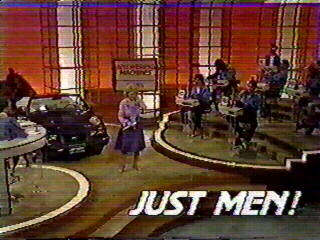
Just Men! is an American game show that aired on NBC Daytime from January 3 to April 1, 1983. The show starred Betty White, who won an Emmy award for her work on the show, with Steve Day announcing. It pitted two female contestants who were asked to predict answers to a series of yes/no questions posed previously to a panel of seven male celebrities.

Miljoenenjacht, officially Postcode Loterij Miljoenenjacht, is a Dutch game show, sponsored by the country's postcode lottery, where a contestant and at-home viewer could win up to €5,000,000 or as little as €0.01. The show is broadcast at various times, spanning across six episodes for each set. The program was originally shown by TROS on NPO 2, but moved to creator John de Mol's channel Tien in 2005. After the channel was discontinued after its sale to the RTL Group, the program moved to RTL 4. In 2019, the program moved to SBS6 due to the transfer of Linda de Mol from RTL to SBS.
Lose a Million was an early 1990s British game show which was produced by Action Time for Carlton Television and was hosted by Chris Tarrant. The show featured voiceovers by Honor Blackman.
Love Me, Love Me Not is a Canadian game show based on the Italian game show, M'ama non m'ama, which in English means "love me, love me not". Both shows were created by Steve Carlin, the producer of The $64,000 Question in the 1950s. In 1988 there was a British version of the show, with the same name.
On the Spot is an American game show produced by and broadcast on KGW-TV in Portland, Oregon as a daily series from September 1984 to October 1988. Newscaster Larry Blackmar was host, while local disc-jockey Michael Bailey announced.
The Neighbors is an American game show. It aired on ABC from December 29, 1975 to April 9, 1976. It included five female neighbors as contestants, who were asked gossip questions about each other. Regis Philbin co-hosted the show with Jane Nelson, and Joe Seiter was the announcer. It was produced by Bill Carruthers.












